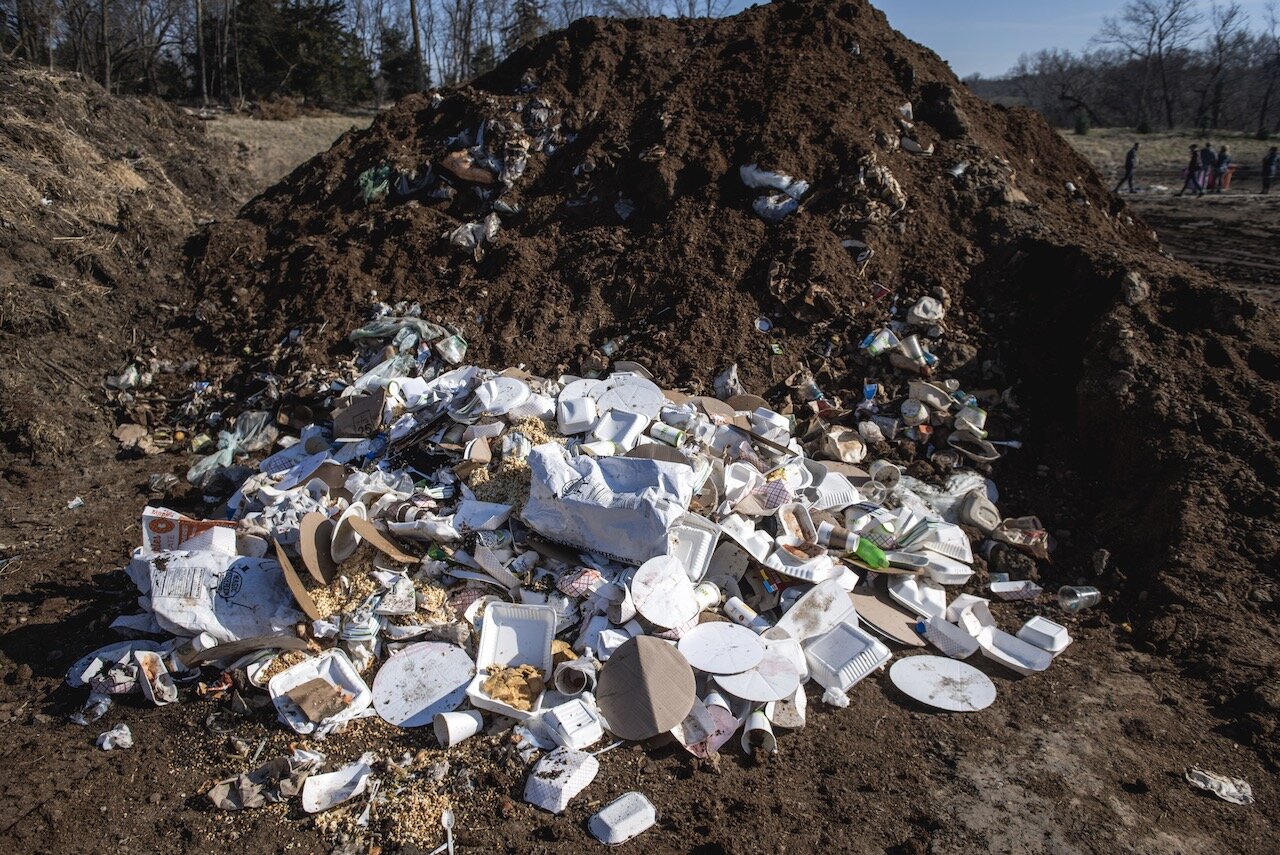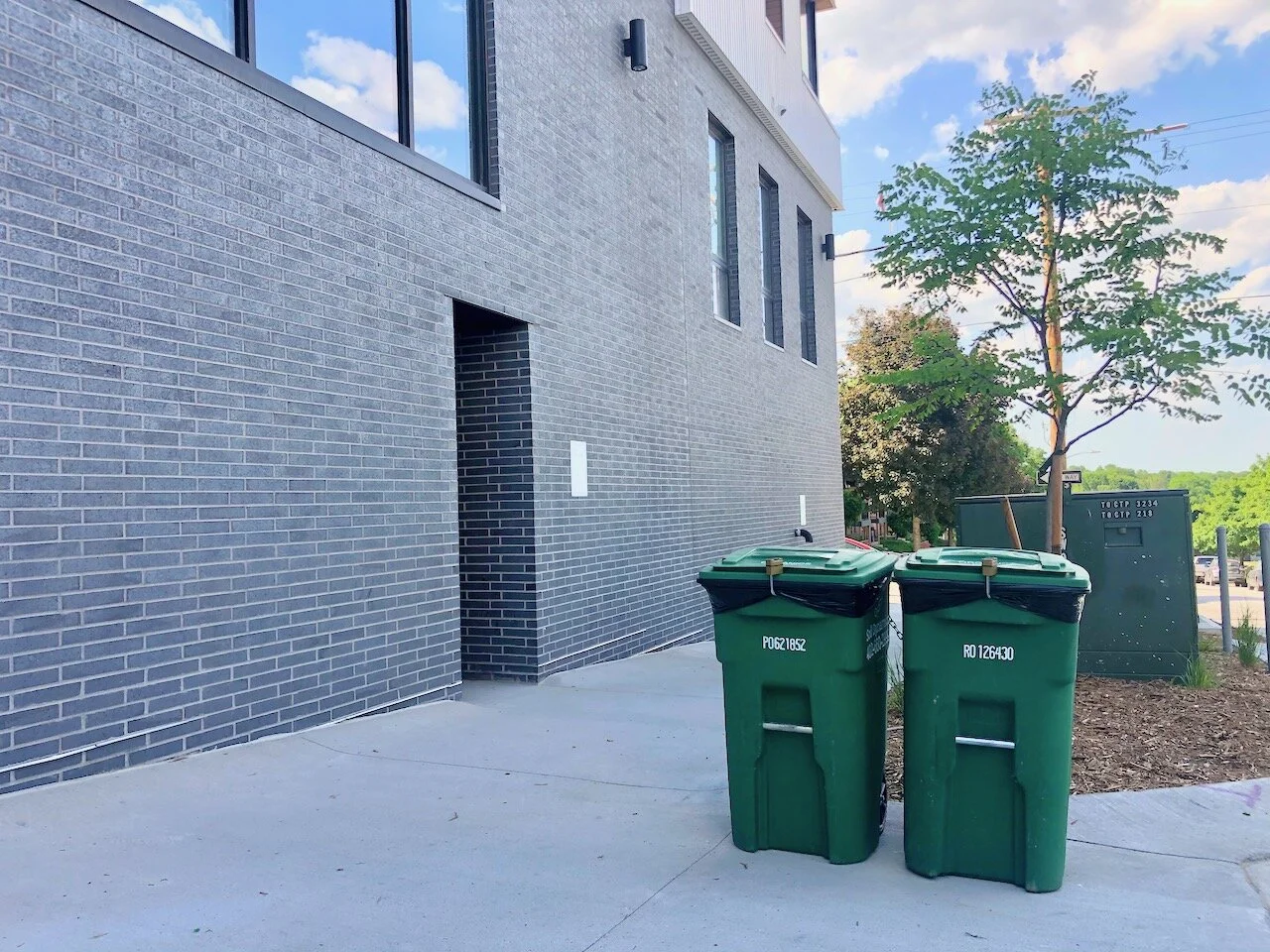Case Study: How We Helped Gain the Nation's First Green Certified Food Hall
The Switch Beer & Food Hall in Omaha, Nebraska’s Blackstone District had a sustainability goal of getting a Green Restaurant Association certification, so we partnered with them to oversee their solid waste program to get them there. The result was being awarded a 3-star certification with 233.08 GreenPoints™ and becoming America’s first Green Restaurant certified food hall in the process (which we first announced here).
Premise: This looks into how your organization or business can meet its own sustainability goals & pathways to achieving those goals byway of using The Switch as an example.
Watch Our Video Explainer Here For the Full Story
Background
The Switch is a food hall on the main floor of a new construction apartment building. While owned and operated by GreenSlate Development, the seven food concept bays are occupied by individually owned and operated tenants. Needing to stick out from two existing Omaha food halls and anticipating large quantities of single-use service-ware due to a small dishwashing space, GreenSlate responded to these challenges by making sustainability a main feature.
To verifiably show their commitment to sustainability, GreenSlate decided to follow a pathway that would set them up for a Green Restuarant Association (GRA) Certification. Since 1990, GRA remains the first and clear leader in setting and tracking sustainability standards for the restaurant industry.
HOW THEY DID IT
The Switch reached its goal only two months after opening on June 22nd, 2020, because the majority of the eco decisions were made long before the doors ever opened.
Working with architects at Alley Poyner and guidance from GRA, The Switch went with eco-features like 100% LED lamps, drywall with 95% pre-consumer waste, and solar heat blocking window film.
Ecolab hand soap, a pre-rinse sprayer that uses less than .45 gallons per wash, an Energy Star low temp dishwasher and emphasis on vegetarian dishes all gained big points.
But after the first assessment, GRA only issued The Switch 188 GreenPoints™, resulting in only 2-stars.
At that point, we worked with GRA’s Restaurant Sustainability Consultant to review the disposable and solid waste practices we oversee. This resulted in The Switch’s points increasing to 233.08 and earning its current 3-star status, making eco-history right here in Omaha.
You can read the full report here, but we’ll focus on how our collaboration with The Switch set them up for success …
Here’s How Our Partnership Helped
Built Environment Consultation
Missed Opportunity: When opening a space, procuring a waste hauler is generally last on the list of vendors to hire. But we’ve found this creates problems and increases long term costs. That’s because most architects and engineers are still designing for the landfill model instead of the Zero Waste model. The landfill model often creates trash enclosures to small to handle expanded recycling & composting programs, lack of in-house space to properly separate recycling & composting streams, or trucks being unable to attach to non-mobile dumpsters.
Solution: With The Switch, we sat down with the architects half a year before opening to review plans and ensure the spatial needs of GreenSlate and our programs worked well together.
Material Sourcing
Compostable Service-ware Used At The Switch
Missed Opportunity: Purchasing certified compostable items is confusing due to the lack of standardization and murky “green” marketing tactics. Like items that use less plastic, but unbeknownst to the buyer cannot be recycled or composted. On top of that, most people aren’t familiar with how to properly dispose of things like compostable cups.
Solution: When you eat at The Switch, 100% of the single-use items are compostable, simplifying the disposal process. And to alleviate purchasing confusion, we joined GreenSlate at an initial Sysco meeting months before opening to ensure what they wanted to use was indeed compostable at our site.
Dual-Stream Recycling
Missed Opportunity: Many facilities in Omaha currently only recycle cardboard, or still use a single-stream recycling dumpster that now has a lower recyclability rate.
Solution: We provide an up-to-date program with post 2018 China Ban recycling requirements, meaning The Switch is able to recycle a wider array of materials with a higher rate of recyclability, getting the facility closer to its Zero Waste goal.
Composting
Missed Opportunity: Most facilities landfill compostable items.
Solution: Using our affiliate Soil Dynamics’ industrial composting facility – the only such facility in the Greater Omaha Area — we primarily collect pre and post consumer food waste and certified compostable single-use service-ware from The Switch and turn it into nutrient-dense soil.
The Switch is on schedule to compost 55,000 gallons of material in year 1. As the pandemic subsides, that may increase to 81,000 gallons annually.
Staff Training
Missed Opportunity: While hauling companies provide a transportation service, they usually don’t provide support in helping a facility acclimate to a recycling program.
Solution: Along with two in-person staff trainings, we developed an online guide that managers can not only use for their own reference, but given employee turnover in the service industry, use this resource to outsource new hire training.
Bins, Placement, and Signage
Missed Opportunity: Often little thought is put into the colors of the bins a facility purchases, the placement of them and the type of signage that goes with it. But when these are wrong, participation decreases and contamination increases.
Solution: We worked with The Switch’s graphic team to develop branded front-of-house and back-of-house signage in tandem with national color standards and our local market. We figured out a front-of-house strategy that simplified the disposal process for customers and a back-of-house strategy using confined spaces and two existing trash chutes.
Customer Engagement
Missed Opportunity: Along with the atmosphere, food and drinks, waste is something everyone creates and engages with when at The Switch. But due to our “Out of Sight, Out of Mind” theory of waste, most people’s experience with this is mindless.
Solution: Instead we framed the disposal process as a group effort that contributes to The Switch’s Zero Waste goal through the poster listed above.
Commerce Loop
Missed Opportunity: Many restaurants are ditching hard-to-recycle styrofoam and converting to compostable take-out packaging. But residential customers are putting these waste items in the wrong places and don’t know it. When a compostable cup goes into recycling, it costs recycling centers money to get it out of the stream and ends up in the landfill. When it goes to the landfill, it puts off methane gas for a few decades.
Solution: We developed a recycled-paper hand flyer to go with take-out orders that educates the customer on how to properly dispose of their take-out packaging using our residential service called Compost Club. We included a free-month discount code specific to The Switch and set-up a Compost Club drop-off site right outside the facility. Which means that after the customer signs up for Compost Club, they drop off their compostables outside of The Switch before potentially going back in to make another order.
Audits
Missed Opportunity: Sustainability programs fall apart if no one’s paying attention or takes ownership.
Solution: To ensure all 7 individual tenants were complying with the front-of-house compostable single-use material program, we did an audit check of every item being passed to the customer. We also provide waste audits, encourage businesses to set-up green teams, and create clear succession plans.
Circular Economy
Problem: Many use our composting service, but few actually incorporate the finished product into the facility.
Solution: The potted plants inside The Switch use our soil as a way to demonstrate the circular economy. For other partners, we supply soil and mulch for landscaping and/or food gardens that further connect the composting service to its benefits.
The Switch’s compostables will come back to the space as soil
Eco-Marketing
Problem: Many businesses have green practices and pay more for them, but they don’t see an ROI because the marketing department isn’t equipped with the understanding and language to talk about them and develop business because of it.
Solution: We provided copy for how to talk about their programs in marketing pieces, such as the front page of the website and social media posts. We also provided PR support by writing a press release that was sent to local, national and trade publications and have been promoting this blog post that’s tailored towards eco-customers.
Results
The great thing is that sustainability doesn’t always have to mean more expensive. As you can see from GRA’s graphic below, The Switch will annually save over $12,000 in energy and water bills. You can read the full report here.

















